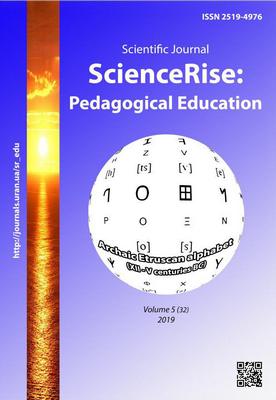The influence of value clarification technique (VCT) learning model on homeland attitude at elementary school
DOI:
https://doi.org/10.15587/2519-4984.2019.177106Keywords:
Value Clarification Technique, Attitudes Love Homeland, Grade IV Elementary School StudentsAbstract
This research aims to know the influence of the learning model Value Clarification Technique against the attitude of the love on homeland at grade IV elementary school or Sekolah Dasar (SD) in Indonesian. Research carried out in SD Negeri 1 Karangmoncol sub-district of Purbalingga Karangsari, using the quasi experimental research with patterns of non-equivalent control group design. This study uses two groups, the experimental group by using the learning Value Clarification Technique and control model with are not given preferential treatment. Research results show that; 1) attitude of love of the fatherland grade IV treatment given the learning Value Clarification Technique model, 2) there is the interaction model of learning against the attitude of the love of the fatherland, 3) attitude to love fatherland students given the treatment learning model The Value Clarification Technique is higher than the students who were given the treatment model of cooperative learning. This research shows that the attitude of the motherland love between the Value Clarification Technique and control group is a difference of significance
References
- Wijayanti, A. T. (2013). Implementasi Pendekatan Values Clarivication Technique (VCT) dalam Pembelajaran IPS di Sekolah Dasar. SOCIA: Jurnal Ilmu-Ilmu Sosial, 10 (1), 72–79.
- Samani, M., Hariyanto, M. S. (2012). Konsep dan model pendidikan karakter. Bandung: Remaja Rosdakarya.
- Saksono, I. G., Dwiyanto, D. (2012). Faham keselamatan dalam budaya Jawa. Yogyakarta: Ampera Utama.
- Zajonc, A. (2006). Love and Knowledge: Recovering the Heart of Learning Through Contemplation. Teachers College Record, 108 (9), 1742–1759. doi: https://doi.org/10.1111/j.1467-9620.2006.00758.x
- Attarian, A. (1996). Integrating Values Clarification into Outdoor Adventure Programs and Activities. Journal of Physical Education, Recreation & Dance, 67 (8), 41–44. doi: https://doi.org/10.1080/07303084.1996.10604837
- Kirschenbaum, H. (1976). Clarifying Values Clarification: Some Theoretical Issues and a Review of Research. Group & Organization Studies, 1 (1), 99–116. doi: https://doi.org/10.1177/105960117600100109
- Oliha, J., Audu, V. I. (2015). Effectiveness of value clarification and self-management techniques in reducing dropout tendencies among secondary school students in Edo State. European Journal of Education and Development Psychology, 3 (1), 1–13.
- Edwards, A. W. (2005). Values clarification as a therapeutic process. A paper presented in NACSW Convention Grand Rapids.
- Brady, T. F., Oliva, A. (2008). Statistical Learning Using Real-World Scenes. Psychological Science, 19 (7), 678–685. doi: https://doi.org/10.1111/j.1467-9280.2008.02142.x
- Gray, J. R. (1987). Value Clarification: a Step Towards Technological Literacy. Bulletin of Science, Technology & Society, 7 (1-2), 197–205. doi: https://doi.org/10.1177/027046768700700134
- Kirschenbaum, H. (2013). Values clarification in counseling and psychotherapy: Practical strategies for individual and group settings. New York: Oxford University Press. doi: https://doi.org/10.1093/acprof:oso/9780199972180.001.0001
- Thoresen, J. C., Francelet, R., Coltekin, A., Richter, K.-F., Fabrikant, S. I., Sandi, C. (2016). Not all anxious individuals get lost: Trait anxiety and mental rotation ability interact to explain performance in map-based route learning in men. Neurobiology of Learning and Memory, 132, 1–8. doi: https://doi.org/10.1016/j.nlm.2016.04.008
- Naim, N. (2012). Character buliding optimizing the role of education in the development of science & national character formation. Yogyakarta: Ar - Ruzz Media.
- Hebert, D. G., Kertz-Welzel, A. (Eds.) (2016). Patriotism and Nationalism in Music Education. Ashgate Publishing, 208. doi: https://doi.org/10.4324/9781315599731
- Dimitrova, R., Buzea, C., Ljujic, V., Jordanov, V. (2013). The influence of nationalism and national identity on well-being of Bulgarian and Romanian youth. Studia UBB Sociologia, 58 (1), 69–86.
- Muhaimin, M. (2015). Implementation of the value clarification model in developing the emulation competence of the childhood behavior of the Prophet Muhammad. Journal of Islamic Education and Institutions, 10 (1), 80–96.
- Azwar, S. (2016). Konstruksi tes kemampuan kognitif. Yogyakarta: Pustaka Pelajar.
- Sudjana, N. (2005). Assessment of the results of the teaching and learning process. Bandung: PT Remaja Rosdakarya.
Downloads
Published
How to Cite
Issue
Section
License
Copyright (c) 2019 Anantama Dewantoro, Kus Eddy Sartono

This work is licensed under a Creative Commons Attribution 4.0 International License.
Our journal abides by the Creative Commons CC BY copyright rights and permissions for open access journals.
Authors, who are published in this journal, agree to the following conditions:
1. The authors reserve the right to authorship of the work and pass the first publication right of this work to the journal under the terms of a Creative Commons CC BY, which allows others to freely distribute the published research with the obligatory reference to the authors of the original work and the first publication of the work in this journal.
2. The authors have the right to conclude separate supplement agreements that relate to non-exclusive work distribution in the form in which it has been published by the journal (for example, to upload the work to the online storage of the journal or publish it as part of a monograph), provided that the reference to the first publication of the work in this journal is included.








